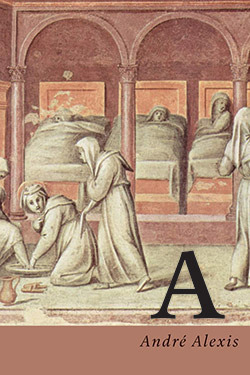
Since David Gilmour’s idiotic remarks of last week, there have been many clever responses, but the cleverest by far comes from a source that predates Gilmourgate by a few weeks: the novella, A, by André Alexis, published earlier in September by Bookthug. Part satire, part parable, A will really, really, really appeal to those who care about Toronto’s literary scene.
I could be wrong. A might have nothing to do with David Gilmour. I don’t trust my ear for satire anymore. Ever since I pegged Gilmour’s remarks for parody, I’ve been wracked by self-doubt. I’ll make my case and let you be the judge.
The satirical part of A
A tells the story of a mediocre book reviewer named Alexander Baddeley who is obsessed with the poetry of Avery Andrews, author of First, After First, More, Again More, Still More, More Two and More Three. Baddeley is working on a critical study of the poet’s oeuvre and hopes to meet the man, but nobody has seen him in years. To find the poet, he enlists the help of his novelist friend, a womanizing narcissist named Gil Davidoff. Get it? Get it? Huh? Huh? At one point, Davidoff tells Baddeley about the importance of managing women “’cause if your reputation’s in tatters you don’t get what matters.” Here are some other gems from and about the Gil:
“They’re pretty good, nurses. Know their stuff. But I prefer actresses. You can screw an actress for weeks without doing the same woman twice. Know what I mean?”
Yes, Gil was self-absorbed and self-important but his flaws had never put Baddeley off. Speaking with Gil was like watching a bird with a broken wing attempt flight: round and round going nowhere.
Whenever he grew tired of himself, spending time with Davidoff allowed Baddeley to grow tired of someone else.
The friendship dissolves when a publisher asks Baddeley to write a blurb for Davidoff’s latest novel, Slow Boat to Peru. Baddeley observes: “The only thing that ever changed, in Gil’s fiction, was the locale. In the past, his protagonists – never more than stand-ins for Gil himself – had been delirious in Paris, delirious in Mexico, delirious in Bolivia, and delirious in Kuala Lumpur.”
In case you think it’s a stretch to suggest that David Gilmour is the target here, consider what Gil says to Baddeley at a literary festival reception:
–I didn’t know you had a novel in you, Davidoff continued. I even heard it was okay. But you should be writing non-fiction. That’s the thing these days. I’m writing about all the great television I’m making my son watch. [See here for the reference.]
–That sounds interesting, said Baddeley.
–Plus chicks love it when you’re an authority on something, said Davidoff.
Get the feeling Alexis has this guy’s number? Here’s the icing on the cake:
–I don’t know what I did to make you go all silent, Alexander, but I bet you miss me even more than I miss you, eh?
To Baddeley’s knowledge, this was as close to an apology as Davidoff had ever come…
The portrayal is uncanny. It’s as if Alexis had a copy of Gilmour’s September 25th National Post “apology” a year ago when he was writing A. It’s as if Alexis has the omniscience of God. Oh, and speaking of God …
The parable part of A
Eventually, Baddeley finds the elusive poet who agrees to show Baddeley precisely how he gets his inspiration. Together, they go to the Toronto Western Hospital at the corner of Dundas and Bathurst and enter a mysterious room of impossible dimensions. There, Avery Andrews introduces a man in a hospital bed who is “God” (always in quotation marks). It is “God” who fills Andrews with all his words. But the privilege of literary talent is also a burden. The “traumatic empathy” that comes from a radical identification with people, animals, things, experiences is wearing on Andrews. He wants Baddeley to kill him and assume the privilege for himself. That’s how Andrews got the privilege in the first place. Years ago, he pushed Margaret Laurence from a ferry and she drowned (contrary to the official account of her death which every Canadian school child knows—or ought to know—was suicide after a diagnosis of terminal cancer). Baddeley gets what he seeks, and we look on as he bears the cost. The parable offers up a meditation upon talent, inspiration, empathy and responsibility. It all sounds quite heavy, but, really, it’s the funnest read I’ve read in a long time.
Between Gilmour with his Fordisms and Alexis with his jabs, Toronto has suddenly become an entertaining place for those who love letters. I can hardly wait for the fist fights.